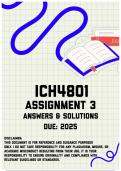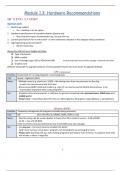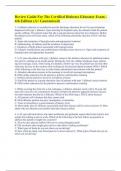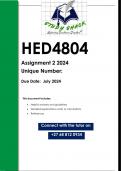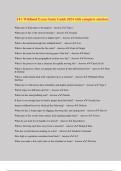Business Management Notes (MNB1501)
Study Unit 1: The Business World and Business Management
The role of business in society
• Transformation of resources into goods and services society needs.
• Business cannot operate without society.
• Needs and values of society influence what business does?
- Protecting the environment.
• Organizations influence behaviour patterns of people in a particular society by developing new
products.
- Impact of cell phones & tablets on social life.
• Success of business has an impact on the prosperity of a society.
- Mining towns.
Needs and need satisfaction
• Humans have many varied and seemingly unlimited needs.
• Society has limited resources to satisfy those needs, which requires a choice to be made about how
best to utilize the limited resources.
• Most people have limited resources (money) to afford our unlimited wants, so we have to decide
how best to utilize the little we have to obtain the greatest satisfaction.
• Decision to obtain the maximum benefit (satisfaction) with the limited resources = Economic
Principal.
• Consumerism = the social force that protects consumers from unsafe products and malpractices by
exerting moral and economic pressure on business.
• According to Maslow, all humans have same basic needs, but not everybody strives to satisfy the
same ones also that once basic needs (hunger) are satisfied, we strive to satisfy the next level
- Security etc.
• Unlimited needs (Maslow’s hierarchy):
1. Physiological Needs (hunger, thirst)
2. Security Needs (protection)
3. Social Needs (love, recognition)
4. Esteem Needs
5. Self-Realisation Needs
• Basic Physical and Psychological needs may overlap
• Limited Resources
1. Natural Resources (land, forests, water)
2. Human Resources (labour, physical and mental talents)
3. Capital (buildings, machinery, computers – Not for final human consumption)
4. Entrepreneurship (Individuals who accept the risk, also rewarded with profits for the risks)
, lOMoARcPSD|7257373
Main Economic Systems
• Free Market Economy (free enterprise system)
o Products and services demanded by a community is supplied by private organisations
seeking profit.
o Members of a community may possess assets and earn profits from them.
o Allocation of resources are affected by free markets
o Community can freely choose between products, services, place to stay etc.
o Minimum interference from the state.
o Right for individuals to possess property such as land, buildings equipment vehicles etc.
o People are free to do with their assets as they wish (freedom of distribution).
o Freedom of choice – producers can decide whether they can profitably produce products.
• Command Economy
o Alternative to Market Economy
o Known as communism
o State owns and controls resources and factors of production
o System of communal ownership. Individuals own no land, factories or equipment
• Socialism o Compromise between Free Market and Command Economies
o State owns and controls the principal/strategic industries (steel man, transportation,
communication, health and energy)
o Private initiative controls less important and smaller maters such as trade and construction.
o Strategic and basic resources should belong to every member of the community (Command
Economy), the rest operate within the Free Market Economy.
• Mixed Economy
o Includes a mix of both public and government control (capitalism and socialism)
o Degree of private economic freedom with centralized economic planning and government
regulation
The prevailing economic system is South Africa is a Socialist-Oriented economy with a High degree of
government participation and control.
The need-satisfying institutions of the free market economy
• Business Organisations
o Also known as Profit Seeking Businesses
o Most are privately owned (Private Enterprises), but state can also own businesses.
o State owned business = Public corporations (Transnet etc.)
• Government Organisations
o Do not operate on a profit-seeking basis.
o Also known as Government Departments
o Provide a service to the community.
o Obtain funds from Treasury (people pay for these services through taxes).
• Non-Profit-Seeking Organisations:
o Owned by state and private organisations
o Do not strive to make a profit
o Seek just sufficient income to cover costs
o Sports clubs, welfare, religious etc.
, lOMoARcPSD|7257373
The Nature of Business Management and the Classification of the Study Material for Business
Management
• Purpose and task of Business Management = Achieving the maximum output with the lowest
possible input of production factors.
• Purpose of Business Management = Produce the most units of products or services at the lowest
possible cost
• Task of Business Management = Study of the principals that have to be applied to make a business
as profitable as possible. Could include a study of the environmental factors that could have an
effect on the success of an organization, its survival or its profitability.
• Economics = Study area of economic problems in the community
• Business Management = Focus on the problems of the individual organisations in the same
community.








